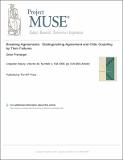Breaking Agreements: Distinguishing Agreement and Clitic Doubling by Their Failures
Author(s)
Preminger, Omer
DownloadPreminger-2009-Breaking Agreements Distinguishing Agreement and Clitic Doubling by Their Failures.pdf (702.9Kb)
PUBLISHER_POLICY
Publisher Policy
Article is made available in accordance with the publisher's policy and may be subject to US copyright law. Please refer to the publisher's site for terms of use.
Terms of use
Metadata
Show full item recordAbstract
In this article, I propose a novel way to distinguish between agreement and clitic doubling. The innovation lies in examining what happens when the relation between the relevant agreement morphology and the full noun phrase fails to obtain: whether the agreement morpheme still shows up, bearing default -features, or disappears altogether.
The workings of the proposed diagnostic are demonstrated using a family of constructions in “substandard” Basque (Etxepare 2006). Besides supporting the proposed diagnostic, the analysis of Basque provides a new perspective on the typological status of the Basque agreement system, as well as evidence against the traditional analysis of unergatives in Basque as being underlyingly transitive.
Date issued
2009-10Department
Massachusetts Institute of Technology. Department of Linguistics and PhilosophyJournal
Linguistic Inquiry
Publisher
MIT Press
Citation
Preminger, Omer. “Breaking Agreements: Distinguishing Agreement and Clitic Doubling by Their Failures.” Linguistic Inquiry 40.4 (2009): 619-666. © 2009 by the Massachusetts Institute of Technology
Version: Final published version
ISSN
0024-3892
1530-9150
Keywords
agreement, clitic doubling, Basque, unergatives, long-distance agreement